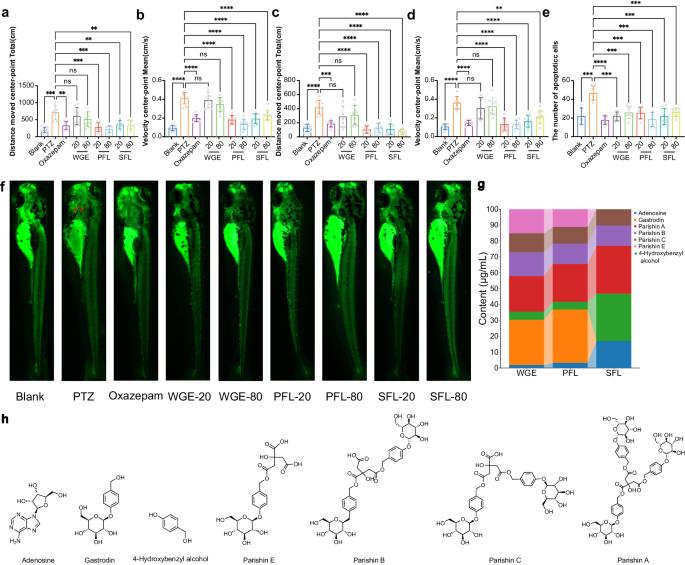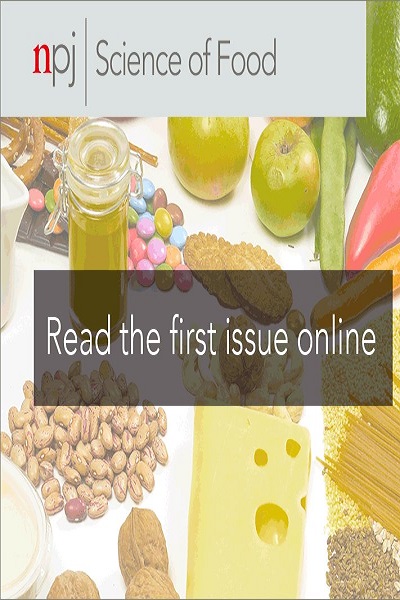Sleep promoting and omics exploration on probiotics fermented Gastrodia elata Blume
IF 6.3
1区 农林科学
Q1 FOOD SCIENCE & TECHNOLOGY
引用次数: 0
Abstract
Fermenting Chinese medicinal herbs could enhance their bioactivities. We hypothesized probiotic-fermented gastrodia elata Blume (GE) with better potential to alleviate insomnia than that of unfermented, thus the changes in chemical composition and the insomnia-alleviating effects and mechanisms of fermented GE on pentylenetetrazole (PTZ)-induced insomnia zebrafish were explored via high-performance liquid chromatography (HPLC) and mass spectroscopy-coupled HPLC (HPLC-MS), phenotypic, transcriptomic, and metabolomics analysis. The results demonstrated that probiotic fermented GE performed better than unfermented GE in increasing the content of chemical composition, reducing the displacement, average speed, and number of apoptotic cells in zebrafish with insomnia. Metabolomic investigation showed that the anti-insomnia effect was related to regulating the pathways of actin cytoskeleton and neuroactive ligand-receptor interactions. Transcriptomic and reverse transcription qPCR (RT-qPCR) analysis revealed that secondary fermentation liquid (SFL) significantly modulated the expression levels of neurod1, msh2, msh3, recql4, ercc5, rad5lc, and rev3l, which are mainly involved in neuron differentiation and DNA repair. Collectively, as a functional food, fermented GE possessed potential for insomnia alleviation.

对益生菌发酵天麻的睡眠促进和 Omics 研究。
对中草药进行发酵可提高其生物活性。因此,我们通过高效液相色谱(HPLC)和质谱耦合HPLC(HPLC-MS)、表型、转录组学和代谢组学分析,探讨了益生菌发酵的天麻对戊四唑(PTZ)诱导的失眠斑马鱼的化学成分变化、缓解失眠的作用和机制。结果表明,在增加失眠斑马鱼的化学成分含量、降低其排泄量、平均速度和凋亡细胞数量方面,益生菌发酵过的普通食品比未发酵过的普通食品表现更好。代谢组学研究表明,抗失眠作用与调节肌动蛋白细胞骨架和神经活性配体-受体相互作用的途径有关。转录组和逆转录 qPCR(RT-qPCR)分析表明,二次发酵液能显著调节神经元分化和 DNA 修复过程中神经元 1、msh2、msh3、recql4、ercc5、rad5lc 和 rev3l 的表达水平。总之,作为一种功能性食品,发酵普通谷物食品具有缓解失眠的潜力。
本文章由计算机程序翻译,如有差异,请以英文原文为准。
求助全文
约1分钟内获得全文
求助全文
来源期刊

NPJ Science of Food
FOOD SCIENCE & TECHNOLOGY-
CiteScore
7.50
自引率
1.60%
发文量
53
期刊介绍:
npj Science of Food is an online-only and open access journal publishes high-quality, high-impact papers related to food safety, security, integrated production, processing and packaging, the changes and interactions of food components, and the influence on health and wellness properties of food. The journal will support fundamental studies that advance the science of food beyond the classic focus on processing, thereby addressing basic inquiries around food from the public and industry. It will also support research that might result in innovation of technologies and products that are public-friendly while promoting the United Nations sustainable development goals.
 求助内容:
求助内容: 应助结果提醒方式:
应助结果提醒方式:


